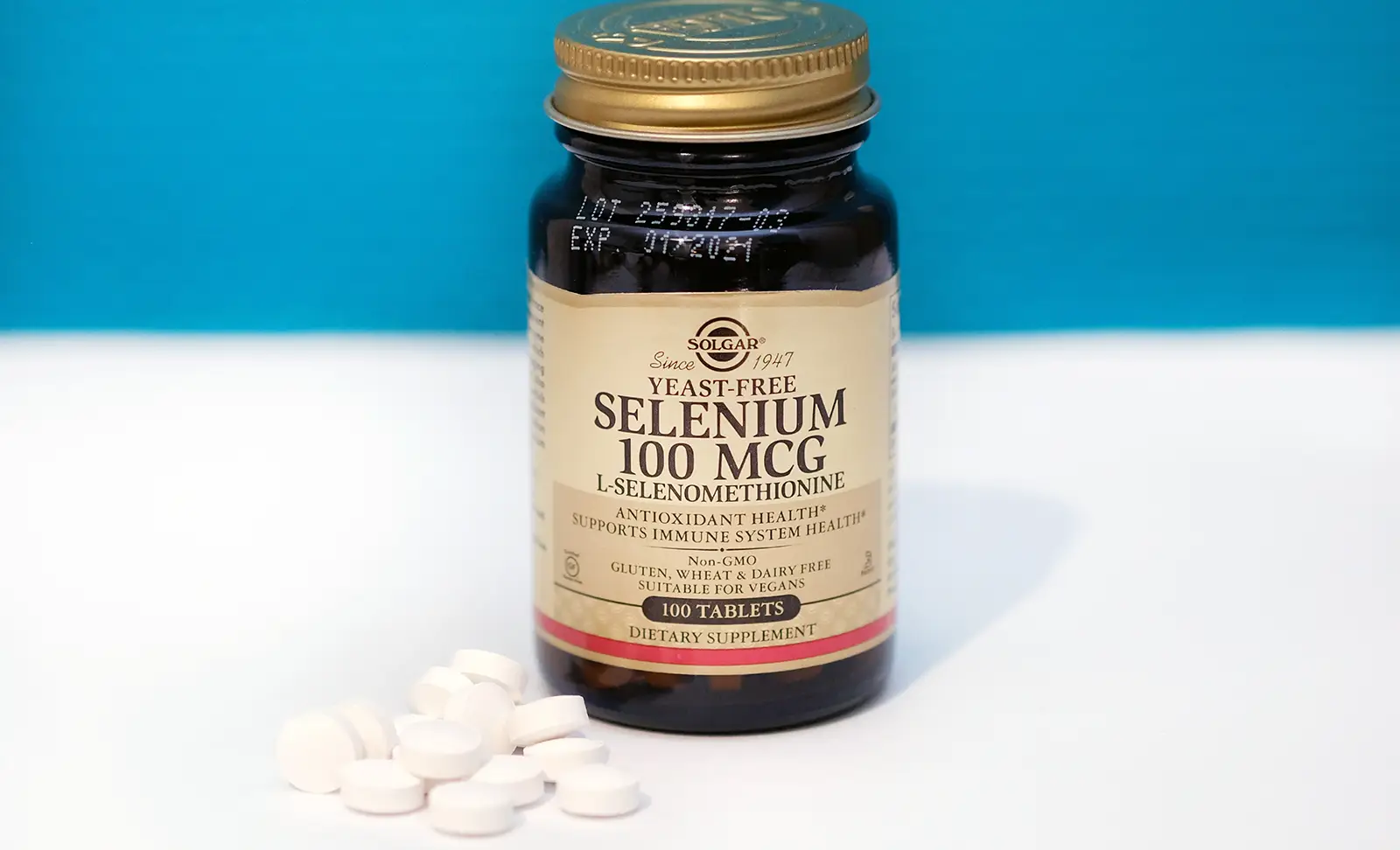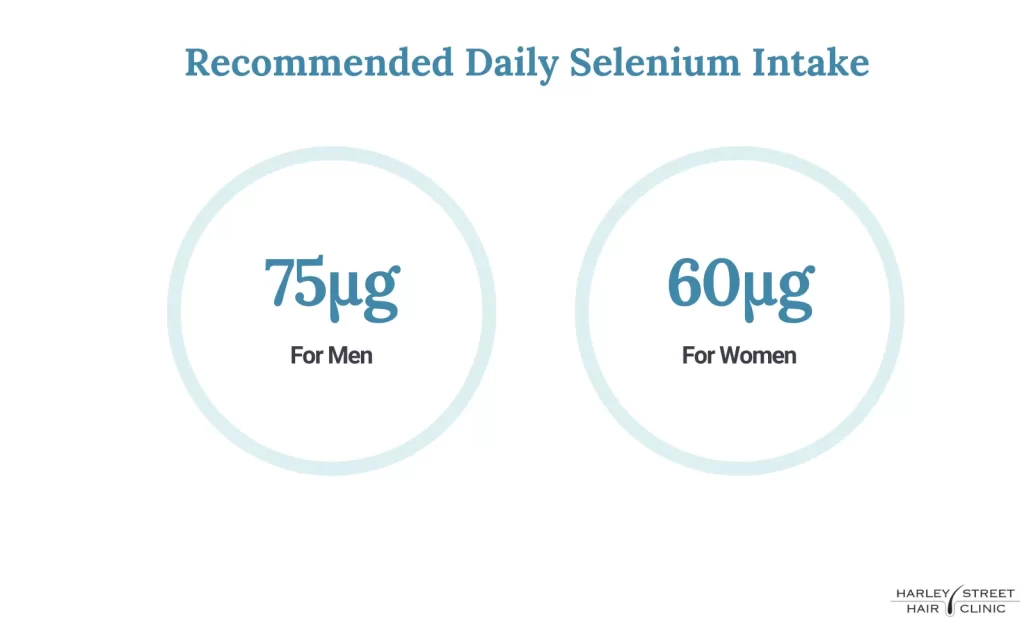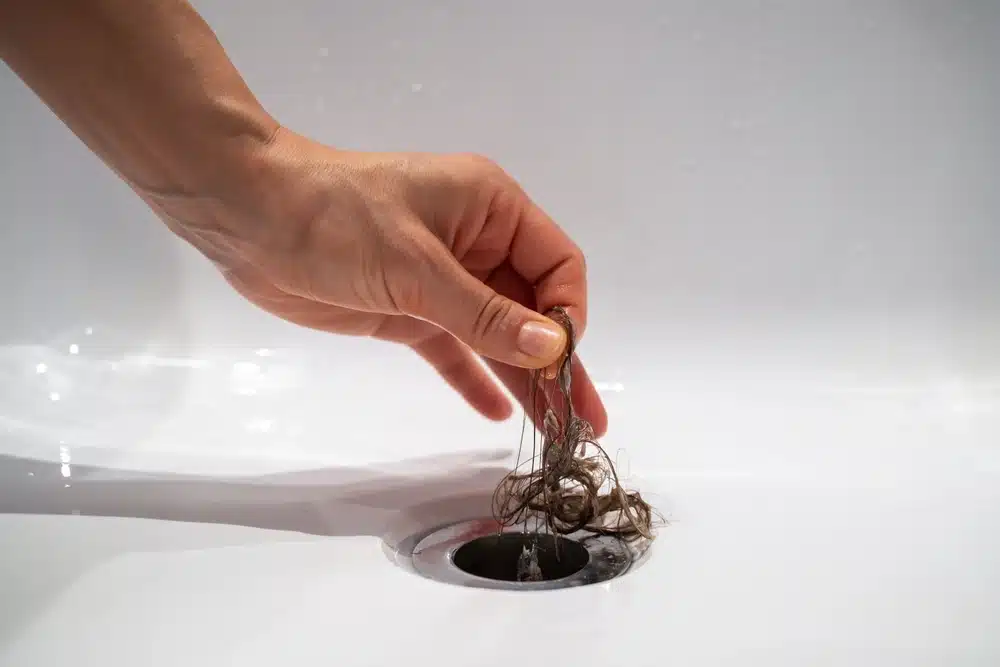When experiencing hair loss, your mind likely thinks of every possibility – could it be the stress you’ve been under or perhaps a vitamin deficiency? One deficiency that could be the problem is selenium, which means taking this supplement may be beneficial for regrowing a full head of hair.
So, what exactly is selenium, and does taking these supplements have any benefits? Does it work as a hair loss treatment? Learn all you need to know in this thorough guide.
What is Selenium?
Selenium is a trace mineral essential to your body’s functions and is found in foods like fish, eggs, sunflower seeds, and lean meats.
Selenium is important for your metabolism, immune system, and thyroid health – although consuming too much can also cause issues. Most people do not have a deficiency, so taking an extra selenium supplement will likely have little to no benefit. However, being low in selenium can cause problems to the body, and there is even research that indicates a link between low selenium levels and an increased risk of cardiovascular disease. [1]
Regarding how much selenium you need to maintain a healthy body, it is 75μg daily for men and 60μg for women. [2]
Can Selenium Help with Hair Growth?
Possibly. At this point, only a handful of studies have investigated it, so research is limited. In one study, [3] patients with alopecia areata were studied, and they were observed to have lower selenium levels, although these findings are not 100% consistent.
However, a selenium deficiency may lead to hair loss, which means taking selenium through dietary supplements when you have a deficiency could lead to new and healthy hair growth.
Want to Monitor Hair Growth? Try Our Hair Track App
The Benefits of Selenium for Hair Growth
Knowing that there is potentially a link between selenium and hair loss, you might wonder how selenium can promote hair growth. Here’s how it works.
Protection from UV Damage
Selenium can reduce oxidative stress on the hair (an imbalance of free radicals and antioxidants). Selenium is a source of antioxidants and protects your strands, especially from UV damage. Spending too much time in the sun can cause your hair to become dry and more prone to breakage; selenium may help prevent this.
Treating Seborrhoeic Dermatitis
Selenium may be able to treat seborrhoeic dermatitis, with selenium sulphide used to relieve itching of the scalp. [4] Seborrhoeic dermatitis can lead to hair loss, especially if the inflammation and itchiness are intense, as the physical scratching can harm the hair follicles and stunt growth. That means that selenium as a treatment for this could indirectly lead to hair regrowth.
It Could Treat Chemotherapy Hair Loss
Patients undergoing chemotherapy end up losing their hair because of the intense drugs. Selenium may be a solution here, as a patient’s levels of selenium significantly drop during this process, which may contribute to hair shedding. However, more research into this is necessary.
The Signs of a Selenium Deficiency
Are you worried you have a selenium deficiency? If you have hair loss due to selenium deficiency, these are the other signs that may be present:
- Fatigue
- Brittle Nails
- Weakened Immune System
- General Weakness
- Changes to Mood
- Memory Loss
- Difficulty Concentrating
- Hypothyroidism
- Reproductive Issues
If you show these signs and think you have a selenium deficiency, speak to your doctor as soon as possible, as that is the first step to getting answers and then seeking appropriate treatment.
Side Effects of Taking Selenium Supplements
Selenium supplementation when you do not need it can cause serious issues. Here are some of the side effects of selenium toxicity.
- Nausea
- Vomiting
- Diarrhoea
- Rash on Skin
- Brittle Nails
- Hair Loss
- Fatigue
- Neurological Problems
- Paralysis
- Liver Damage
- Kidney Damage
As you can see, some of these symptoms are very serious and require medical attention.
How to Be Safe When Taking Selenium
Do you want to get the most out of the selenium benefits for hair growth? If so, it’s crucial to be safe when taking this supplement to ensure you avoid toxicity.
Never Take More than 400 Micrograms: The body should never take in more than 400 micrograms of selenium. That is the tolerable upper intake level – more than this, and you could develop selenium toxicity.
Consult a Healthcare Professional: It’s always best to consult a healthcare professional before taking any supplement, including selenium, as risks are involved.
Only Take if Necessary: Do not take selenium based on an assumption that you have a deficiency – get a real diagnosis from the doctor.
Know the Signs of Toxicity: Know the signs of selenium toxicity to know what to watch out for; if you show any of these symptoms, stop using.
Purchase from a Reputable Source: Don’t buy any selenium you find sold online; instead, focus on purchasing from reputable brands so you know what you are getting.
Aim to Get Selenium from Food Sources: Unless you have a significant selenium deficiency and require supplements, it’s generally better to get this trace mineral from food sources, which we’ll go into below.
Getting Enough Selenium in Your Diet
The good news is that most people do not need to take selenium for hair growth, as it’s easy enough to get enough of this mineral in your diet. Here are some of the foods that contain selenium:
- Brazil Nuts
- Eggs
- Tuna
- Salmon
- Beef Liver
- Brown Rice
- Wholemeal Bread
- Sunflower Seeds
- Pork
- Chicken
- Turkey
As you can see, a wide range of foods contain selenium, so whatever your dietary needs, you can incorporate it naturally into your diet.
Could Other Dietary Supplements Help with Growth?
Unsure about selenium for hair growth? Many supplements on the market claim to help users regrow their hair, such as hair skin and nails pills, which usually include ingredients such as biotin and keratin. Many people also take straight biotin supplements for this purpose.
The truth is that you will likely only experience positive results from supplements if you already have a deficiency. The main deficiencies that cause hair loss include iron, vitamin D, zinc, biotin, vitamin B12, folate, and riboflavin. [5] If you think a deficiency in any of these is causing your hair loss, it’s best to get your blood levels checked at the doctor, and, if you have a deficiency, begin taking supplements as instructed.
Alternative Solutions for Hair Growth
Is selenium hair regrowth not working for you? Perhaps you have learned that you do not have a selenium deficiency and want to look at alternative solutions.
The first step here is understanding what is causing your hair loss. Several possibilities include androgenetic alopecia (male or female pattern baldness – the most common cause of hair loss), telogen effluvium, traction alopecia, and more. If unsure, speaking to a hair specialist or dermatologist can shed some light on the matter.
From there, you can find plenty of hair restoration options that may work well for you, including:
Hair Loss Medications
There are several hair loss medications you could try. The first is minoxidil, a topical treatment often found under the brand name Rogaine, which works by opening up the blood vessels and boosting blood flow to the follicles, encouraging new growth. Finasteride and Dutasteride also work as hair loss medications, but these are specifically for men due to their effect on the hormone DHT.
Low-Level Laser Therapy
Low-level laser therapy is a treatment that involves using low-level lasers directed at the scalp or any other place experiencing hair loss. This helps stimulate the follicles to boost new growth. You can get this done in a clinic or even purchase a device in your home.
Platelet-Rich Plasma Injections
PRP injections involve harvesting a patient’s blood to be used in an injection. This injection goes directly into the scalp, with the growth factors present in the platelets helping activate the follicles and stimulate new growth.
A Hair Transplant
Several types of hair transplants are available, including the DHI, FUT, and FUE hair transplant. The most advanced include DHI and FUE, as they extract individual follicles, which then get implanted into the recipient area, where they take root and grow new hair. Despite being a surgical procedure, it’s minimally invasive with a short recovery time. It is undoubtedly the most effective method for regrowing a full head of hair, with results lasting forever.
Selenium for Hair Growth: In Summary
Selenium hair growth is a slight possibility if you have a selenium deficiency. However, suppose you are not deficient in selenium. In that case, there is no point in taking the supplement, and it could even lead to unpleasant side effects such as increased hair shedding, fatigue, and a weakened immune system.
If you want to look at different options from selenium for hair growth, we have you covered. At Harley Street Hair Clinic, we provide high-quality FUE hair transplants to a range of patients, so get in touch today if you’re ready to enjoy a full head of hair once more. If you want to see what our surgeons can do, head to the patients gallery.
Sources:
- https://pmc.ncbi.nlm.nih.gov/articles/PMC1829306/#:~:text=It%20is%20hypothesized%20that%20low,supplements%20prevent%20coronary%20heart%20disease.
- https://www.nhs.uk/conditions/vitamins-and-minerals/others/#:~:text=The%20amount%20of%20selenium%20you,women%20(19%20to%2064%20years)
- https://pmc.ncbi.nlm.nih.gov/articles/PMC5939011/
- https://dermnetnz.org/topics/selenium-sulfide#:~:text=How%20does%20selenium%20sulfide%20work,fungal%20infection%20of%20the%20scalp.
- https://www.healthline.com/nutrition/how-diet-affects-hair-loss#:~:text=A%20deficiency%20in%20one%20or,19%20%2C%2020%20%2C%2021%20).




